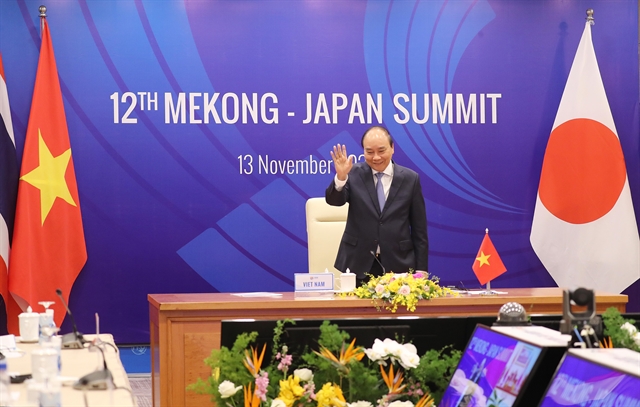 Politics & Law
Politics & Law


|
| Prime Minister Nguyễn Xuân Phúc at the 12th Mekong-Japan Summit on Friday. – VNA/VNS Photo Thống Nhất |
HÀ NỘI – Leaders from Mekong countries and Japan have pledged to strengthen cooperation at the 12th Mekong-Japan Summit on Friday.
The world economy and Mekong region continued to face challenges due to the COVID-19 pandemic, natural disasters and geopolitical instability, they said, reiterating their joint efforts in combating the pandemic and recovering the economy at the same time.
The leaders of the Mekong countries lauded the initiatives proposed by Japanese PM Suga at the summit, including Sustainable Development Goals (SDG) Mekong, strengthening cooperation on regional supply chains and programmes to enhance capacity building in a number of specialised sectors.
They agreed to step up connectivity, emphasising that economic development should go in tandem with environmental protection.
They also underlined the need to enhance climate change adaptation, use and manage Mekong River water resources in a sustainable way as well as push up digital transformation and regional supply chain development.
Speaking at the summit, Japanese Prime Minister Yoshihide Suga said Mekong is a centre of Asia-Pacific.
“Japan will propose concrete measures for the Mekong region so that we can work together for regional peace and prosperity. By doing so, I am confident that our bonds will become even stronger,” he said.
Prime Minister Nguyễn Xuân Phúc said Mekong countries and Japan had worked together to overcome the financial crisis in 2008 and boost economic growth over the past decade.
The two sides had maintained their close coordination in the fight against COVID-19 pandemic.
Through Mekong-Japan cooperation, hundreds of projects had been rolled out in different fields, significantly contributing to socio-economic development of the Mekong countries and the implementation of the ASEAN Community Vision 2025, the PM said.
He cited the Tokyo Strategy 2018 for Mekong-Japan Cooperation with the three pillars of vibrant and effective connectivity, people-centred society, and the realisation of a Green Mekong.
The strategy had brought about remarkably changes in high quality infrastructure, human resources development, and environmental protection in the region.
While emphasising the important contribution of the Mekong-Japan strategic partnership to the economic and social development of member countries, PM Phuc proposed some orientations for the development of Mekong-Japan cooperation in the future.
Among them, controlling the COVID-19 pandemic and gradually resuming production and business activities in a new “normal” environment would be the most urgent task, he said.
To execute the task, Phúc suggested countries reinforce their trade and investment ties, as well as collaboration in healthcare through information sharing and vaccine development, ensuring that all countries are equal in access to the vaccine.
It was necessary to enhance cooperation of the sustainable management of Mekong River water resources, and natural disaster and climate change response, he said.
At the end of the meeting, the leaders approved a joint statement and agreed to convene the 13th Mekong-Japan Summit in Japan next year.
The 11th Mekong–Japan Summit, held in Bangkok in November last year, adopted the joint statement of the 11th Mekong-Japan Summit and the Mekong-Japan Initiative for Sustainable Development Goals (SDGs) towards 2030.
The participating countries committed to stepping up the implementation of the Tokyo Strategy 2018 in tandem with the realisation of the SDGs in Indo-Pacific, and the Ayeyawady-Chao Phraya-Mekong Economic Cooperation Strategy (ACMECS) Master Plan. – VNS




